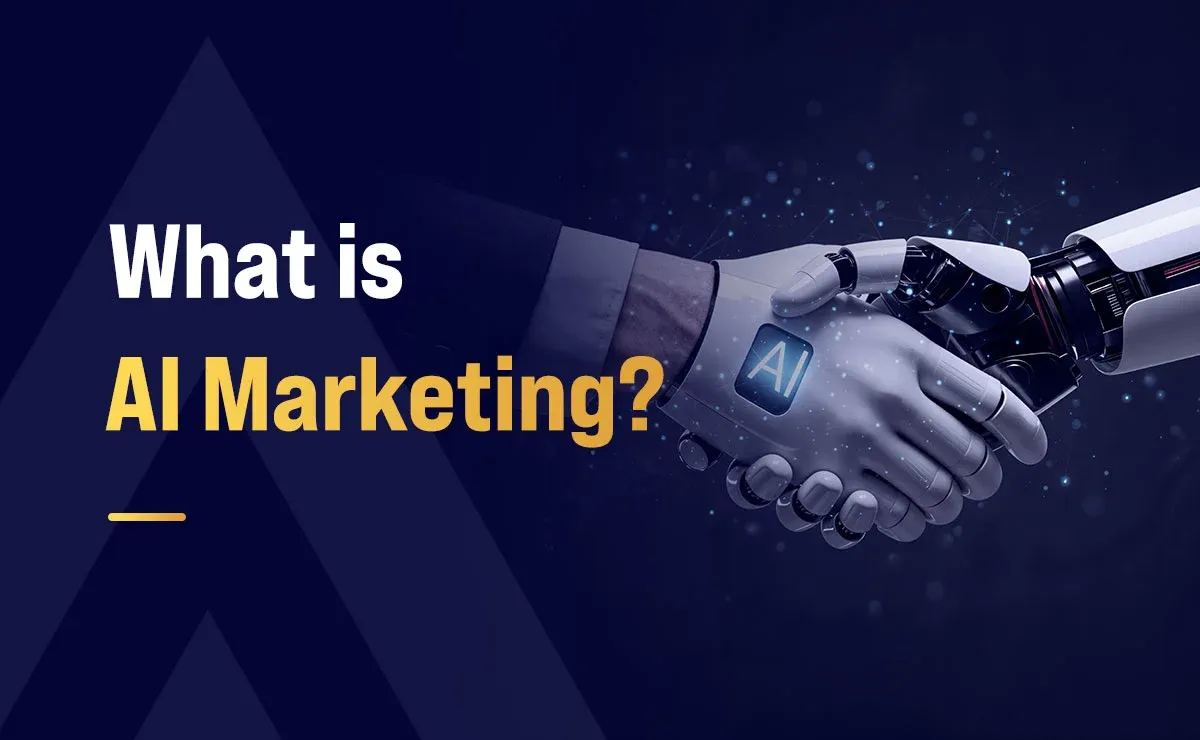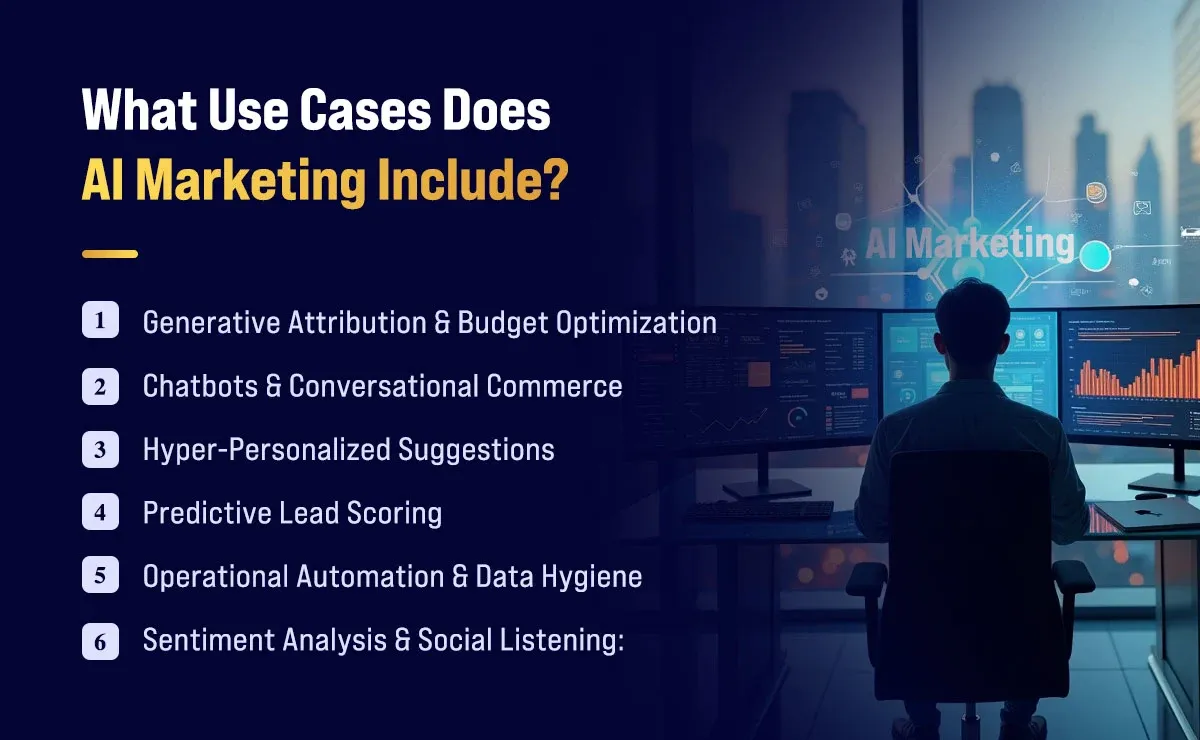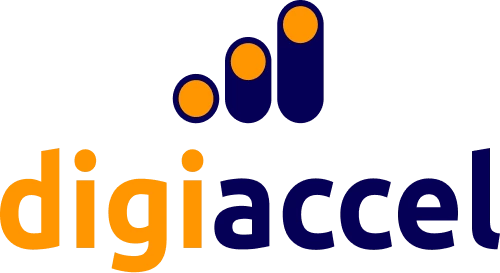What is AI Marketing?

Modern marketing requires flawless accuracy in campaigns to ensure that the right message reaches the ideal audience at the optimal time—effortlessly and on a scale. While traditional methods rely on educated guesses and historical data, artificial intelligence transforms marketing from reactive to predictive and from generic to genuinely personal.
AI in marketing isn’t meant to supplant human creativity; instead, it enhances strategic decision-making by leveraging data-powered insights that analyze countless customer interactions in real time. This article explores what AI marketing is in detail, grounded in both foundational AI concepts and real-world examples.
What Is AI (Artificial Intelligence) Marketing?
AI marketing is the strategic integration of artificial intelligence technologies into marketing operations to automate decision-making, personalize customer experiences, and optimize campaign performance at an unprecedented scale.
Unlike traditional marketing approaches that depend on manual analysis and rule-based systems, AI marketing leverages sophisticated algorithms to process massive datasets in real time and generate actionable insights.
The foundation of AI marketing rests on four key technological pillars:
- Machine Learning: Algorithms that automatically learn from data patterns to make predictions and recommendations without explicit programming.
- Natural Language Processing (NLP): NLP transforms complex marketing data into human-readable insights, automates content creation, analyzes customer sentiment, and enables conversational interactions with analytics platforms.
- Computer Vision: Systems that analyze visual content to understand images, videos, and user behaviors across digital touchpoints.
- Predictive Analytics: Sophisticated statistical frameworks that anticipate upcoming consumer actions, industry shifts, and performance results of marketing initiatives.
AI marketing platforms continuously ingest data from multiple sources like website interactions, CRM systems, social media feeds, and third-party databases, to create a comprehensive view of customer behavior. This constant data influx fuels a rapidly expanding market; in fact, the global AI marketing industry is forecasted to hit $217.33 billion by 2034, expanding at a staggering 26.7% compound annual growth rate.
Key Use Cases of AI Marketing
AI-driven marketing revolutionizes customer engagement and enhances operational efficiency within businesses. Here are the key use cases reshaping modern marketing:

- Generative Attribution & Budget Optimization: Moving beyond oversimplified first-click or last-click attribution, AI provides a complete picture of your customer journey. Advanced attribution models evaluate every touchpoint, from that initial Google search to the final email that sealed the deal, helping you allocate budget where it truly drives results.
- Chatbots & Conversational Commerce: AI-powered chatbots handle routine customer inquiries, guide product selection, and even complete purchases—available 24/7 without any downtime. This allows your human workforce to dedicate their expertise to nurturing high-value customer interactions and driving strategic growth.
- Hyper-Personalized Suggestions: Imagine Netflix predicting your next favorite series or Amazon anticipating your shopping needs before you do. AI recommendation engines analyze individual preferences and behaviors to create highly relevant product suggestions that drive engagement and sales.
- Predictive Lead Scoring: Sales teams receive prioritized prospect lists based on AI analysis of historical conversion data, company characteristics, and engagement signals. This ensures your sales team focuses exclusively on high-potential prospects, enhancing both operational productivity and conversion outcomes.
- Operational Automation & Data Hygiene: AI handles the tedious but critical tasks of data cleaning, asset organization, and performance monitoring. Clean, organized data ensures your marketing decisions are based on reliable insights rather than flawed information.
- Sentiment Analysis & Social Listening: AI monitors online conversations about your brand across social media, review sites, and forums, providing real-time insights into customer sentiment. This proactive alert system enables swift problem resolution and the ability to leverage favorable trends in real time.
These applications demonstrate how AI marketing goes beyond automation—it is about making smarter decisions faster, creating more meaningful customer experiences, and freeing your team to focus on strategy and creativity.
Types of AI Marketing Solutions?
AI marketing solutions have evolved into three distinct categories, each solving different pieces of the modern marketing puzzle:
Machine Learning (ML) Systems
Machine learning forms the foundation of intelligent marketing automation. These platforms identify trends within datasets to generate forecasts and refine choices autonomously, eliminating the need for manual coding. ML operates through three main approaches:
- Supervised Learning: Predicts specific outcomes using historical data, like identifying which leads will convert or which customers might leave.
- Unsupervised Learning: Discovers hidden patterns in your data, such as finding unexpected customer segments or detecting unusual purchasing spikes.
- Reinforcement Learning: Adapts through iterative experimentation, refining ad placements and tailoring content based on performance insights.
Key applications include personalization engines that know exactly what each customer wants, predictive analytics that forecast your next quarter's performance, and campaign optimization that never sleeps.
Big Data & Analytics Platforms
Think of these as your marketing command center, turning overwhelming data streams into clear, actionable insights. Customer Data Platforms (CDPs) become your single source of truth, unifying information from every touchpoint, including CRM, website, social media, and purchase history, into complete customer profiles.
Real-time analytics let you react instantly to market changes, while predictive modeling helps you stay ahead of trends rather than chasing them. User-friendly dashboards convert intricate datasets into intuitive visual narratives, empowering every team member to make data-driven decisions.
Integrated AI Marketing Platforms
Comprehensive platforms embed AI throughout entire marketing workflows, eliminating the need to stitch together multiple tools:
- Salesforce Einstein: Offers AI-powered campaign creation and real-time personalization across all customer touchpoints.
- Adobe Sensei: Provides generative AI for content creation plus advanced attribution modeling to optimize your media spend.
- HubSpot Breeze: Automates everything from social media management and customer support to lead scoring, saving teams hundreds of hours weekly.
- Specialized Tools like Jasper: Focus specifically on AI-powered copywriting and content creation at scale.
These platforms represent the future of marketing technology—where AI handles the repetitive tasks while amplifying your team's creativity and strategic thinking.
Challenges of AI Marketing Implementation
While AI is transforming the marketing landscape, adopting, and scaling it for real-world campaigns is not without its challenges. From data limitations and organizational resistance to regulatory concerns and technical complexities, businesses must navigate a range of obstacles before realizing AI’s full potential.
Data Quality and Training Time
AI's effectiveness hinges on high-quality, relevant data and adequate training time. Fragmented, inconsistent, or biased data (common across CRM, ad platforms, and social channels) leads to unreliable AI outputs. Moreover, businesses often underestimate the time needed to gather labeled data, test algorithms, and iterate for meaningful results. Rushing this process yields underperforming models.
Privacy and Ethics
Privacy compliance and ethical considerations have become increasingly complex, with regulations like GDPR and CCPA requiring strict data handling protocols. Organizations must balance personalization effectiveness with consumer privacy expectations, especially when 73% of customers actively seek these personalized experiences, making privacy compliance even more essential.
Barrier to Adoption
Resistance to organizational change, particularly with AI adoption, often stems from a lack of AI literacy, with 71.7% of non-adopters citing this as their reason for hesitation. Therefore, success hinges on comprehensively educating the team, fostering cross-functional collaboration, and implementing AI gradually through pilot projects that clearly demonstrate value.
Managing AI Deployment and Integration
Integrating AI tools into existing marketing technology stacks requires careful platform selection, dedicated technical resources, and a focus on scalable use cases before expanding to complex automation. Furthermore, according to a recent study, 31% of marketers have concerns around the accuracy or quality of AI tools that are being introduced.
Rapidly Changing Marketing Landscape
Rapid technological evolution and market adaptation demand continuous model retraining as consumer behaviors shift, and platform algorithms change. With AI-generated content becoming more widespread, organizations must combine artificial intelligence with human creativity to maintain competitive differentiation in an increasingly automated landscape.
How to Implement AI in Marketing Campaigns?
The following sections outline how marketing campaigns should integrate AI into every stage:
- Define Objectives & Assess Data: Clarify campaign goals and identify which metrics matter. Then ensure your data is clean and AI-ready – many organizations report poor data quality or governance as top AI hurdles. Prepare or integrate datasets (CRM, web analytics, etc.) so models can be trained effectively on high-quality data.
- Select Tools & Strategy: Implement AI technologies that effortlessly sync with your existing digital infrastructure. Define specific use cases (e.g., automating emails, generating ad content, predictive scoring) where AI will add value. Consider starting with a small pilot project with clear KPIs (a limited ad spends or channel) to test an AI tactic before full rollout.
- Implement in Phases: Roll out AI capabilities gradually. Begin with one or two applications (such as predictive analytics for segmenting or an AI writing tool for ads) and expand once they prove effective. This approach prevents marketers from being overwhelmed and allows them to adjust the strategy based on early results.
- Train the Team & Collaborate: Educate your marketing team on new AI tools and data concepts. Create cross-functional teams that integrate marketing, IT, data science, and customer service together so that technical and creative perspectives align. Well-trained, multidisciplinary teams tend to adopt AI more smoothly.
- Launch & Optimize: Use AI to automate execution where possible. For example, let AI handle bid optimization, audience targeting, and creative rotation during the live campaign. Continuously monitor performance dashboards; AI can then recommend or apply adjustments (shifting budget, pausing underperformers, etc.) in real time.
- Review & Iterate: After the campaign, use AI analytics to measure ROI and extract insights. Determine what worked (e.g., which segments converted best, which messages resonated) and feed these learnings into the next cycle. Over time, the system “learns,” improving targeting and creative decisions.
Benefits of Leveraging AI in Marketing
AI not only automates routine campaign tasks but also helps forecast outcomes and tailor content in real time, enabling proactive, data-driven outreach. Here is why leveraging AI in marketing is beneficial:
- Audience Segmentation & Personalization: AI can automatically cluster customers by behavior or demographics and then customize messaging for each group. Machine learning engines analyze user data to tailor content, offers, and recommendations, making campaigns more relevant to each segment.
- Content Creation & Optimization: Generative AI tools can draft ad copy, emails, social posts, or even design visuals and video storyboards. This accelerates content production and SEO optimization while allowing marketers to review and refine AI-generated drafts.
- Media Buying & Real-time Optimization: AI-powered programmatic platforms automate ad buying across channels. These systems use real-time performance data to adjust bids, shift budgets, and swap creatives on the fly, maximizing reach and ROI.
- Chatbots & Customer Engagement: AI chatbots and virtual assistants interact with customers 24/7 on websites or social media. They answer questions, recommend products, and guide purchases in real time, improving service efficiency and collecting data for future personalization.
Real-World Example of AI in Marketing?

Let’s look at a legacy company like Hindustan Unilever (HUL), which is at the forefront of adopting AI integration in its marketing efforts. HUL, one of India’s top FMCG companies, has reimagined its operations and marketing strategy by embedding artificial intelligence across its value chain. This transformation has enabled the company to move from reactive campaigns to proactive, insight-driven marketing.
At the center of this shift is HUL’s AI Hub, a centralized platform that captures, analyzes, and acts upon real-time consumer data. Here’s how HUL is leveraging AI to enhance its marketing efforts:
- Trend Detection and Rapid Innovation: AI tools at the hub scan vast amounts of data like consumer behavior, market shifts, and digital trends to identify potential product ideas. What previously took months or years now happens in weeks, enabling faster product launches and more timely marketing campaigns.
- Predictive Insights: Before launching a product, HUL uses AI to forecast its potential turnover. This helps marketing teams prioritize efforts around the most promising ideas and ensures that campaigns are backed by data-driven confidence.
- Digital Prototyping and Fragrance Libraries: Technologies like robot-assisted fragrance selection (from a library of 2,000+ scents) and 3D printing are used to test products and packaging rapidly. This shortens development cycles and allows marketers to craft compelling narratives around innovation and customization.
- Personalized, Real-time Marketing: By integrating consumer insights directly into the marketing process, HUL tailors messaging and product positioning to specific demographics and preferences, increasing campaign effectiveness.
- Global Connectivity for Consistency: The AI Hub isn’t limited to India, its insights are accessible across Unilever’s global markets, ensuring consistency in branding and allowing successful ideas to scale internationally.
Additionally, HUL’s Dapada factory, which uses AI, IoT, and big data analytics, has been recognized by the World Economic Forum as part of its Global Lighthouse Network. This recognition highlights how AI-fueled operations also feed into marketing advantages by enhancing speed, quality, and responsiveness.
Through initiatives like its ‘Reimagine HUL’ strategy, the company illustrates how artificial intelligence can transform legacy operations into agile, consumer-first marketing powerhouses.
Summing Up
The transformation of marketing through artificial intelligence is more than a tech upgrade—it’s a shift in how brands understand, engage, and serve consumers. Companies like HUL are already redefining the rules with AI-driven innovation cycles and data-powered consumer insights. But the key to success lies in balance: clean data, thoughtful tool selection, and using AI as an amplifier of human creativity—not a replacement.
The real question isn’t if you should adopt AI, but how effectively you can do it while keeping your brand authentic and human. The future of marketing belongs to those who combine intelligence with empathy, strategy with automation—those who master intelligently human-enhanced marketing.

